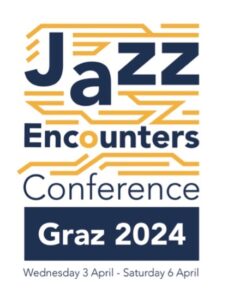 At the 8th international jazz studies conference of the Rhythm Changes project, at KUG, in Graz, Austria, I was delighted to be giving a keynote address. The theme of the conference was jazz encounters, and my talk was looking at the relation between jazz and disability studies, with particular reference to the multiply disabled African-American multi-instrumentalist, composer, bandleader and activist, Rahsaan Roland Kirk. So looking forward to it. Bit nervous too tbh. Here’s an extract, from my conclusion (probably), where I sought to end with a rising note.
At the 8th international jazz studies conference of the Rhythm Changes project, at KUG, in Graz, Austria, I was delighted to be giving a keynote address. The theme of the conference was jazz encounters, and my talk was looking at the relation between jazz and disability studies, with particular reference to the multiply disabled African-American multi-instrumentalist, composer, bandleader and activist, Rahsaan Roland Kirk. So looking forward to it. Bit nervous too tbh. Here’s an extract, from my conclusion (probably), where I sought to end with a rising note.
[A second version of this talk is given to those involved in the UK community music organisation Musical Keys, which specialises in working with music and disabled people, in May 2024.]
To recap: at its best, we can think of jazz as a generous, generative, and inclusive form which has wanted and been able to accommodate the differently embodied or minded, because jazz was capable of flexibility and sought novelty, and because jazz was a music forged in the experience of oppression, resistance and liberation.
In its concern with the individual voice of expression, its fetish of the desire for the musically unique in tone or approach, jazz was open and welcoming to those who could, as Laurie Stras has put it, ‘sing a song of difference’ (2009). Similarly, for Alex Lubet, jazz is a music ‘whose essence is the embrace of difference’ (Lubet 2011, 65). To sing, to embrace: these are warm human actions, in which the body is expressing and enfolding.
This embrace of its inner crip is there in the fundamentals of the music—its freak noises and effects, its syncopated rhythms that are alla zoppa, its out-of-control dancing body, its acceptance of alternate techniques or voices. The embrace is also there in the music’s history and innovation, from the very start, in the United States (Buddy Bolden) as well as in Europe (Django Reinhardt).
And, as its musicians have aged or transformed, experiencing diminished or different physical capacities, say, jazz has offered ways to keep them playing and hear and enjoy their ‘late’ (in Straus’s meaning) wisdom. As Alex Lubet, jazz’s strongest advocate in terms of disability, argues,
it is clear that jazz is a musical social confluence within which artists with physical disabilities are able to pursue or continue their careers. This owes to the nature of jazz virtuosity, which does not simply permit but demands personal idiosyncrasy (2013, 154).
This isn’t simply to do with a disabled and then multiply disabled jazz musician like Rahsaan Roland Kirk, one single case study, but with the fundamental identity and practice of jazz as it has developed over the past century or century-and-a-half. The relationship between jazz and disability is a neglected site of creative and social practice that, if we but listen, speaks to a vital concern for contemporary society: how we treat and live with our disabled loved ones, how we make access and expression, how we negotiate the personal transformations and crises of ageing, of accident, of health. Jazz has good advice. Jazz guides. This is the wisdom of Lubet’s point about the
musical tradition [of] jazz, in which improvisation, re-composition/arrangement and broad latitudes of interpretation are not only acceptable, but fundamental. These conditions, the need for individual creativity and cultural empathy, also characterize the demands of living with a disability (2013, 167; emphasis added).
Do you see? Jazz guides.
Key sources
-
Cole, Montgomery Charles. 1998. The Life and Music of Rahsaan Roland Kirk. DMA (Clarinet) thesis, University of Cincinnati.
- Fraser, Benjamin. 2023. Beyond Sketches of Spain: Tete Montoliu and the Construction of Iberian Jazz. Oxford: Oxford UP.
-
Kruth, John. 2021. Bright Moments: The Life and Legacy of Rahsaan Roland Kirk. 2nd edn. New York: Jackalope Press.
- Lubet, Alex. 2011. Music, Disability, and Society. Philadelphia: Temple University Press.
- Lubet, Alex. 2013. ‘Oscar Peterson’s piano prostheses: strategies of performance and publicity in the post-stroke phase of his career.’ Jazz Research Journal 7(2): 151-182.
- McKay, George. 2019. Jazz and disability.’ In Nicholas Gebhardt, Nicole Rustin-Paschal, and Tony Whyton, eds. 2019. The Routledge Companion to Jazz Studies. London: Routledge, 173-184.
-
Rowden, Terry. 2009. The Songs of Black Folk: African American Musicians and the Cultures of Blindness. Ann Arbor University of Michigan Press.
-
Stras, Laurie. 2009. ‘Sing a song of difference: Connie Boswell and a discourse of disability in jazz.’ Popular Music 28(3): 297-322.
- Straus, Joseph N. 2011. Extraordinary Measures: Disability in Music. Oxford: Oxford University Press.
